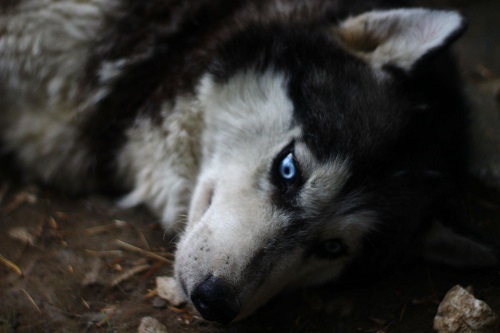Huskies are a fascinating breed known for their striking appearance and strong resemblance to wolves. As with any dog breed, the question of whether Huskies are dangerous can be complex.
This article aims to examine the characteristics of Huskies, the factors influencing their behavior, and the responsible ownership practices that play a pivotal role in determining whether they pose a danger.
Understanding Huskies
Huskies are medium-sized working dogs originally bred to pull sleds over long distances in extreme Arctic conditions. They are characterized by their thick double coats, erect triangular ears, and captivating heterochromatic eyes.
These dogs exhibit intelligence, independence, and a strong prey drive. However, their temperament and behavior are influenced by various factors.
Are Huskies Dangerous?
The question of whether Huskies are dangerous isn’t one that can be answered with a simple yes or no. Like any dog breed, their behavior is shaped by genetics, upbringing, training, and environment.
While Huskies are not inherently dangerous, their natural instincts and energy levels can lead to challenges, especially if not properly understood and managed by their owners.
Factors Influencing Behavior
Several factors play a role in shaping the behavior of Huskies:
Genetics and Instincts
Huskies have retained strong instincts from their wolf ancestors. Their prey drive can lead to chasing small animals, and their pack mentality can influence their interactions with humans and other pets.
Socialization and Training
Early socialization and consistent, positive training are crucial. A well-socialized and trained Husky is more likely to exhibit desirable behaviors and respond well to commands.
Environment and Stimulation
Huskies are active and intelligent dogs that require mental and physical stimulation. Without proper outlets for their energy, they might engage in destructive behaviors.
Owner’s Role
Owners play a significant role in determining whether a Husky becomes dangerous. Neglect, abuse, or improper training can lead to aggression and other behavior problems.

Training and Socialization
Proper training and socialization are key to preventing problematic behaviors:
Basic Obedience Training
Teaching commands like sit, stay, and recall helps establish a clear line of communication between the owner and the dog.
Positive Reinforcement
Reward-based training methods are highly effective with Huskies. They respond well to treats, praise, and play.
Exposure to Various Situations
Early exposure to different people, animals, environments, and sounds helps Huskies develop confidence and adaptability.
Consistent Routine
Establishing a consistent daily routine helps Huskies know what to expect, reducing anxiety and potential behavior issues.
Tips for Responsible Ownership
Owning a Husky comes with responsibilities:
Adequate Exercise
Regular exercise, including walks and playtime, helps keep Huskies physically and mentally fit.
Mental Stimulation
Interactive toys and puzzles challenge their minds and prevent boredom-related behaviors.
Grooming Maintenance
Huskies’ thick coats require regular brushing to prevent matting and maintain their overall health.
Secure Environment
Huskies are known escape artists, so a securely fenced yard and leash when outside are crucial.
Huskies as Family Pets
When raised and trained well, Huskies can be wonderful family companions:
Loyal and Affectionate
Huskies form strong bonds with their families and often thrive on close interactions.
Playful Nature
Their playful and energetic personalities make them great playmates for active families.
Supervision with Small Pets
Due to their prey drive, caution should be exercised when introducing them to smaller pets.
Children and Huskies
Supervised interactions between Huskies and children are essential to ensure safety and respect.
Common Misconceptions
There are several misconceptions about Huskies that need clarification:
Aggression Towards Humans
Huskies are not inherently aggressive towards humans, but any dog can become aggressive if mistreated or provoked.
Difficulty Training
While Huskies have independent streaks, they are intelligent and can excel in training with the right approach.
Cold Weather Tolerance
While they are well-adapted to cold climates, Huskies can live in various environments with proper care.
The Bond with Huskies
Building a strong bond with your Husky is rewarding:
Trust and Communication
Spending quality time and using positive reinforcement create a trusting relationship.
Physical Affection
Huskies often enjoy physical affection like belly rubs and ear scratches.
Shared Activities
Engaging in activities like hiking or jogging strengthens the bond and keeps both owner and dog fit.
When Aggression Arises
Addressing aggression promptly is crucial:
Identify Triggers
Understanding what triggers aggressive behavior helps prevent future incidents.
Consult a Professional
If aggression becomes an issue, consulting a professional dog trainer or behaviorist is recommended.
Safety Measures
Implement safety measures like muzzles or head halters if needed, to prevent potential harm.
Safety Measures
Ensuring safety for all:
Supervision with Children
Close supervision is vital when Huskies interact with children to prevent accidental injuries.
Proper Introduction to Other Pets
Introducing Huskies to other pets should be gradual and controlled to avoid conflicts.
Secure Containment
A securely fenced yard and leash usage during walks prevent escapes and accidents.

Enjoying Life with Huskies
Embrace the joys of Husky ownership:
Outdoor Adventures
Huskies love outdoor activities like hiking and camping, providing opportunities for bonding.
Grooming Rituals
Grooming sessions can become enjoyable bonding experiences.
Learning Together
Training sessions foster mutual understanding and respect.
Conclusion
Huskies are not inherently dangerous, but responsible ownership is crucial. Understanding their needs, training them effectively, and providing a loving environment are key to enjoying a harmonious relationship with these fascinating dogs.
FAQs
Huskies are not naturally aggressive, but like any dog, they can display aggression if not properly trained or treated.
With proper socialization, Huskies can coexist with other pets, but supervision is important.
Yes, they can, but precautions like providing shade and adequate hydration are necessary.
